- Home
- Deck Davis
Rise of the Necromancer Page 2
Rise of the Necromancer Read online
Page 2
He could believe he was walking out of Sun Toil as planned, but the barrens were drawing him in, crooking a finger and beckoning him deeper into its odd mix of desolation and beauty. Leading him into the land where silence sank you into an almost mind-changing isolation, scenery that made you know that you were truly alone in this world and that provoked questions inside even the least insular of men.
Come on. Keep walking, traveler. This way, it would say.
It was wise to ignore that voice, but a man like Gunar didn’t get rich by selling the same old things on the same old routes. The Trader’s Guild saw to that, where the already-rich helped the soon-to-be-rich and kept the undesirables in a lowly-station. The guild made sure that men like Gunar couldn’t join it, and that non-guildies would barely be able to trade a bar of soap in most populous towns and cities.
Men like Gunar had to find a different way to amass gold. They had to listen to sun-soaked voices best left ignored.
If you peeled back the canvas of Gunar’s wagons you wouldn’t find salt, milk, or oats. If you checked his maps you would never see them point to Dispolis nor Thorpe’s Point, nor any of the other cities in the queendom.
He made rare gold traveling rare routes, and in doing so risked the lives of his wife, children, wagon drivers, herders, mercenaries. Once each year he made the journey few traders ever would; a slog across the Sun Toil deserts and canyons. Through the heat and the dry thunder and the dust storms that spun so fast they could flay the skin off a man.
He did it because he knew what waited on the other side of Sun Toil. Across the thousands of desert miles, lived a people as isolated as they were rich. A city filled with folks who would pay fortunes just for one supply run made by the only trader crazy enough to do it.
But Gunar wasn’t rolling dice with his journeys. Or perhaps he was, but he weighted the dice before he let them fall from his hands, and he did this by way of his preparations.
Enough pack animals to carry his inventory three times over and support any in the company who were wounded and unable to walk.
Food and water to last a company three times the size for three times the journey length.
Mercenaries with weapons and training to deal with any of the creatures that hunted in Sun Toil’s barren foothills.
Alchemically treated tents for shelter from the heat and all but the harshest dust storms. Alchemical lotion for everyone to apply to avoid sunburn and solar madness.
A storm oracle who could look at maps and cast his magic at the heavens, then plot a pathway through the Sun Toil storms.
It was usually enough for any contingency, and the lords knew Gunar had seen contingency aplenty and planned for each. It had always been enough, with rarely a loss in his journeys over the years.
It wasn’t enough this time.
CHAPTER 2
One of the spotters leaped up onto his feet so excitedly he almost fell off the wagon. The company had finally reached the middle of Sun Toil after weeks of travel, and now the spotter pointed with his little finger, having lost his index finger after a post-dice argument.
“There’s old Equi!” he shouted. “Come here, you lovely old rock.”
With a shout from the driver below him, the wagon lurched to a stop. It broke too suddenly for the poor spotter, who flew over the edge and landed beside the horses.
His spotter friend hopped down from his cart, patted a horse on the head as he ran past it, and attended to his friend.
“Healer,” he shouted. “Get us a gods-damned healer!”
Gunar strode over, his eyes ablaze, and the hush among camp said that everyone knew why. Even the most ardent perfectionist looked sloppy when standing in Gunar’s shadow, and it made him come off as brash. Talk to Gunar in a tavern back in the fairer parts of the queendom and he’d slap your back and buy you a drink, but join his company on a Sun Toil sojourn, and you’d come to hate the man.
He had to be like that. A Sun Toil crossing was as lucrative a trade route as you could find, but the desert seethed with danger. On his first trip, Gunar had seen one man succumb to the poison of a scorpion sting, and another had come within days of fatal sunstroke. After seeing the man’s skin peel and pus seep out, after listening to him beg the sun for mercy through cracked lips, Gunar had vowed to be the most bastardly of bastards if it meant nobody died on his trips.
Now, his eyes burned hotter than the Toil sun as he strode over to the spotters and cart driver, unsure whether to blame the spotter for standing up on a moving cart, or the driver for halting so suddenly when he knew a man was on his roof.
“Can’t you incompetent sons of a-”
Gunar stopped talking. He traced his gaze north of the spotters and up, up, up to the distant sky. But he wasn’t looking at Equipoint rock, the triangle-shaped natural marker that signaled half their journey was done.
He stared for a second. When he turned away and faced the rest of the camp, the beast-hands and mercenaries and the women and children saw that his face was pale.
“Get me the storm oracle,” he said.
“He’s sleeping,” answered Tek, a young trade apprentice, one of only a few that Gunar had taken on in recent years.
“I don’t care if he’s dug a shit hole and hasn’t finished making his arse sparkling clean, get him here.”
“The oracle says we mustn’t interrupt his sleep. That’s how he sees the storms; in his dreams,” said Tek, in a voice steeped in mystery.
Those who knew Gunar well could see how much he was battling to contain his temper.
“That’s a pan of boiling bison piss,” he said. “He made that up so he can take naps while the rest of us poor bastards work. Wake him up. Drag the coot by his beard if you must. If he’s any sort of storm oracle, he’ll already know you’re coming and he’ll see the storm I’m about to lay on him.”
A woman standing by a caravan in the center of the wagon formation kneeled to the young girl next to her and whispered in her ear. Then she crossed the plains and approached Gunar.
She was tall with strong shoulders that were used to carrying lots of weight, and the worry lines on her forehead spoke about other weights she’d had to bear. Growing up as the elder sister in a family of eight siblings in Trough Yard, the poorest part of Dispolis, she’d had to learn how to take on more weight than a girl should.
This woman had done everything to make sure her seven siblings didn’t suffer the reported sixty percent infant mortality rate that hung like a ghost around districts like Trough Yard. She’d worked, stole, borrowed, she’d done everything save presenting herself at one of the gentleman houses. No matter what she’d been willing to do, she’d always kept a part of herself away from all of that.
Helena Helketoil was tougher than the Sun Toil dirt, and Gunar was proud to have taken her surname when they married, as was the custom of Helena’s people.
He was proud to lead Helena and their daughter and these fine folks back into Toil each year, back to a land that years, years, and years ago once provided a home to Helena’s ancestors.
She was the only one who’d approach Gunar at a time like this. She was the only one capable of lancing the boil of anger enveloping her husband so that he could wipe away the pus and see clearly again. They needed Gunar logical, not angry. Helena was the woman for that.
“What’s got you worked up? We talked about this. You know how my father died,” she said. “You’re greying too fast, Guny. I want to enjoy that chestnut hair of yours for a few years.”
“What the hell do you mean what’s…” began Gunar. Seeing his wife, his features softened. Just like that, a transformation in a second, and now Gunar was lovable and loving again. Just a man standing beside the woman he loved more than anyone, save his daughter. “Oh. Helena. See Equi rock?”
“Course. We’re usually popping corks when we get here.”
“Look at the sky just east of it.”
“Not used to hearing you sound rattled,” she said. Helena studied the
distance, and she furrowed her brow. “Dust storm. Could be headed towards us. I thought the oracle was good?”
“That’s not all. Look west.”
“I can’t see…oh. Oh hell.”
“Oh hell indeed.”
“Two dust storms?” said Helena. “I didn’t even know it was possible.”
“I didn’t know it was possible to pay a king’s gold to an oracle who doesn’t just miss one storm, but two. I’ll hang the bastard from Equi rock, Helena. Or I would, if we didn’t have to change course right now.”
“Change where? We can’t go east, can’t go west. We can’t head north because we’ll hit Straggler’s Gully, and there’s no crossing it.”
“We could try. I’ve heard of people getting through safely.”
“You haven’t heard of the dozens who didn’t, because they didn’t make it back to tell the story. The quicksand will swallow us like a whale gulping shoals of fish. And if we go south, we’ll ride over our own dust prints. We might have to try and thread through the middle of the storms,” said Helena.
“I wouldn’t try and ride through a dust storm’s fart, never mind through the storm itself. But if we stay here, they’re both going to trap us like a mouse in a bullpen.”
Some of the children were distressed. They could feel the change in the air more instinctually than the adults because they were young and hadn’t learned to ignore their intuition yet. It was clear in their pale faces that they were worried.
The necromancer hopped down from a nearby wagon and approached a group of them. He carried a fold of cloth with him.
“Watch this,” he told them.
He gently unfolded the cloth and laid it across the ground, revealing five dead butterflies.
“You can each name one.”
“Why?” asked a child.
“Give one a name, and you’ll see.”
The child tapped his chin with his index finger. “Ga…no. Ter….”
“Get on with it!” shouted another kid.
“Okay, I’ll name that one Sammus.”
He pointed to an ocean blue butterfly with shocks of yellow on its wings. The necromancer smiled. “Sammus, like the knight in the Travelling Bard stories? That’s a good name. Okay, Sammus. Rise!”
He spoke another word now, a word none of them had heard before and that felt uncomfortable to listen to. A terrible light spread from his chest but it was only a snap of it and then the dark feeling was gone, and the butterfly flapped up from the cloth. It fluttered to the boy and landed on his head.
The children laughed and cheered now, speaking all at once so that it was just a din of noise. Some of the parents watched, and their suspicions toward the mancer were eroded even further. A man who could make their kids forget their troubles was good to have around.
Tek emerged from the line of wagons now. A man hobbled in front of him, stopping every few yards like a petulant child, only to get a shove from the apprentice. Tek had less meat on his bones that a fried fly wing, so it said something that he could bully the storm oracle.
But then, Gunar hadn’t hired Tek for his muscles. At age eight, Tek had a head for numbers that would have but a banker to shame. He was apprenticed to an accountant, but getting caught with a fist full of ill-gained gold put an end to that. Deciding that his numbers brain could be put to better use, Gunar had taken him on, vowing to instill a bit of iron and survival know-how to complement Tek’s brains.
The apprentice gave the oracle one last shove until he was standing in front of Gunar. The oracle was a strange man, and it was hard to spend any amount of time in his company without thinking about this constantly.
People sometimes said that pinecones closed upon themselves when a rain bout was due. Well, the oracle looked a little like a human pinecone. Curvy around his arse and belly and then with a thin neck and a small head, and with skin a deep brown tan.
He had a scowling manner about him most of the time, and he’d already proven himself selfish when, on a particularly grueling day, he’d drunk half a barrel of water to himself. A ration like that should have kept six to eight people refreshed for a whole afternoon. When Gunar found out, he wanted to tie the oracle to the roof of a wagon until he baked in the sun and sweated the water back out.
Gunar would never use him again. That was for damned sure. But right now, the oracle was all they had.
“Now, you rotten basta-” began Gunar, before a receiving a look from Helena so sharp that the watching caravaners, the ones who hadn’t already started oiling cartwheels and hinges or playing caravan craps, winced.
“We haaaave a contract, Mr. Helketoil,” said the storm oracle. His accent was from the north of the queendom where people over-pronounced the beginning of their words and added a strange high pitch at the end of them. It always made some of the less mature caravaners laugh.
“It says in my contract I am to divine storms. To do that, sir, I need to sleep. Dreams can’t come to a waking man.”
“Don’t give me that shit. The necromancer explained spells to me. He uses essence from dead cows and stuff. You use something similar; maybe not essence, but something like it. You draw your spell power from the weather, and you use it to divine the future. It’s not as complicated as you like to pretend.”
“To an onlooker, a butcher just chops away at meat. Yet the butcher himself knows his work is more refined.”
“Cut the crap, the smell is making me sick. Look over there, oracle. Look west. Look east. I don’t need an oracle to tell we’ve got two dust storms heading faster than I’d like, and they’re gonna crush us in the middle like a nut between a barbarian’s butt cheeks.”
“Those aren’t dust storms, Mr. Helketoil. They are storms of an altogether plainer variety.”
Gunar studied the oracle now. He always liked to think of himself as a fair man, never quick to judgment so that he’d always feel righteous when he eventually made it.
What he saw on the oracle’s expression wasn’t truth. He knew it as well as a dung beetle knew a pile of manure. He saw a man trying to lie, either wave away his mistakes or save face.
“Tek,” he said. “Get me one of those wooden struts from Argyle’s caravan. Fetch me some rope.”
“We’re hanging him?” said Tek, wide-eyed.
The oracle tensed up. His fingers curled into fists. To cast a spell, maybe? Probably not; mages didn’t become storm oracles if they held a stronger magic in their bones. To be certain, Gunar nodded at two mercs who were watching the scene; one smoking paper and tobacco, the other relaxing against a cart with his finger looped in his belt.
The merc saw his nod and understood the message. Seconds later they were beside the oracle, swords drawn.
“Hanging a man who tells you the truth,” said the oracle. He said the words as carefree as always, yet Gunar’s ears were tuned enough to hear the tremor of fear.
“I’m not hanging you, oracle. You say those are regular storms. Well, we’re turning back and cutting a safer route to be sure. But I’ll give you a nice view of them as they pass. I’ll even tie you to the roof of a wagon so you don’t have to waste precious energy standing up; you can just enjoy the storms. If you’re telling the truth, all you’ll get is a little wet.”
The oracle’s eyes showed his fear now. “Perhaps another reading might help. Storms have been known to change…”
“Mage, do you think I floated down to ground yesterday on the gust of a dragon’s fart? A dust storm isn’t wet. It’s thousands and thousands of dry grains whizzing together so fast they can flay the skin off a man. They don’t come from the clouds. Most importantly, they don’t come from the sky. Look at the storms. They look like they’re coming from the sky to you? Next you’ll tell me a tiger can become a bear if it spends enough time fishing for salmon.”
Helena touched Gunar now. “Guny,” she said, “We better move. Don’t waste any more time on this bastard.”
Orders were issued. Wagon masters checked their route with Guna
r and then relayed it to the driver, while their children or apprentices lashed down any contents inside the canvas that were likely to fly around and smash if they caught the tail end of a storm.
Ostlers and beast-hands checked horse reins and packed away water troughs, making sure to pour unconsumed water back into the rations barrel marked livery and not into the trader’s rations. Many who’d traveled with Gunar still remembered the Toil trip of 2F9, when words like livery written on a water barrel didn’t mean much when accident after accident meant they were all traveling with cracked lips and tight throats.
Two spotters stayed on the front-most caravans, while three others tore south on horseback, where they’d follow the caravaners’ own tracks for two miles before cutting south-south-east some and making sure Gunar’s oracle-free trail was safe.
There was something in the air now. A tension that remained unspoken, and because it was unspoken it seemed to grow stronger. Everyone could feel it.
A wry observer would see mothers holding their children just that bit tighter. Wagon drivers lashing out a little too hard with their whips. Even the spotters, chosen for their ability to stay alert through all kinds of tiredness, weather, and outside danger, felt their nerves prickle.
It was the first real setback of this outing. Not bad considering they’d already traveled halfway, but the horizon seemed to threaten that this obstacle would be a devastating one.
CHAPTER 3
It shot from the sky, a bolt of pure white light. Beautiful when viewed from a safe distance, but terrifying when it exploded just meters away from the wagons.
It happened in a millisecond, the beginning of the chaos that marked the end.
The bolt hit a cart driver, blowing him clean off his seat and onto the ground.
A little boy screamed. Other carts stopped.
The spotter on top of the stricken wagon scampered backward across the roof, his fear refusing to let him stand up, as if the lightning were a hunter who was circling them and ready to come back and finish what he started.

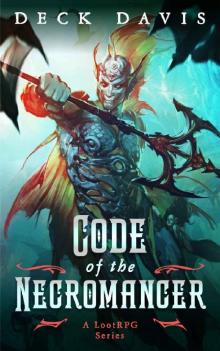 Code of the Necromancer
Code of the Necromancer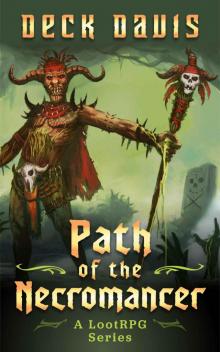 Path of the Necromancer Book 1 (A LootRPG Series)
Path of the Necromancer Book 1 (A LootRPG Series)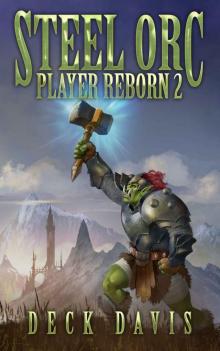 Player Reborn 2
Player Reborn 2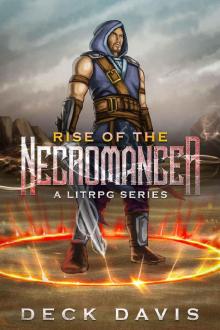 Rise of the Necromancer
Rise of the Necromancer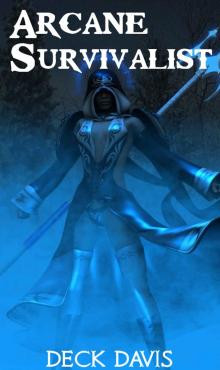 Arcane Survivalist: Apocalyptic Fantasy LitRPG
Arcane Survivalist: Apocalyptic Fantasy LitRPG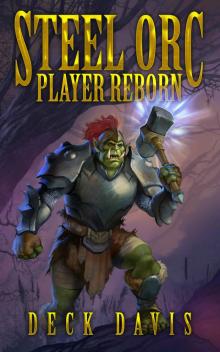 Steel Orc- Player Reborn
Steel Orc- Player Reborn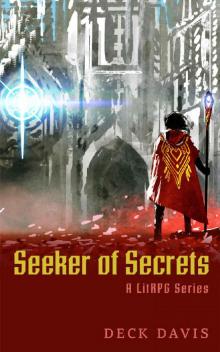 Seeker of Secrets
Seeker of Secrets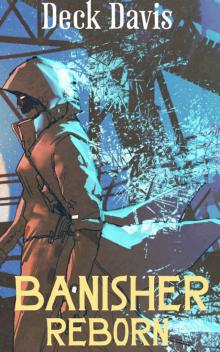 Banisher Reborn
Banisher Reborn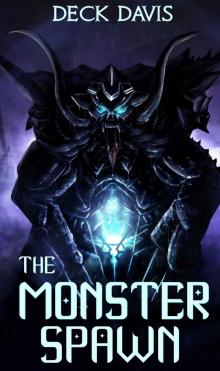 The Monster Spawn: A LitRPG Series (Adonis Rebirth #1)
The Monster Spawn: A LitRPG Series (Adonis Rebirth #1)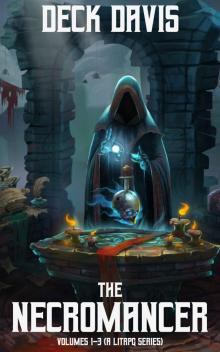 The Necromancer Series Box Set
The Necromancer Series Box Set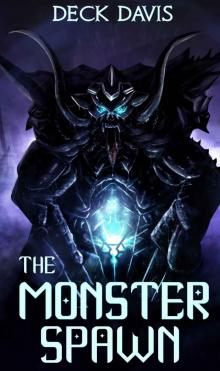 The Monster Spawn
The Monster Spawn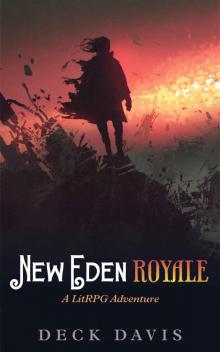 New Eden Royale: A LitRPG Adventure
New Eden Royale: A LitRPG Adventure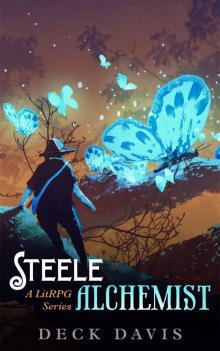 Steele Alchemist: A LitRPG Series
Steele Alchemist: A LitRPG Series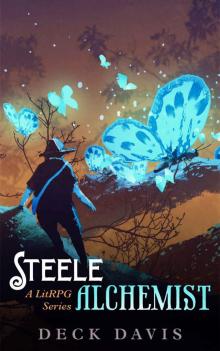 Steele Alchemist
Steele Alchemist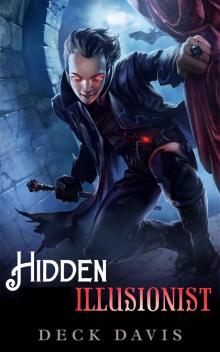 The Hidden Illusionist
The Hidden Illusionist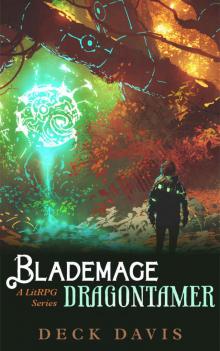 Blademage Dragontamer
Blademage Dragontamer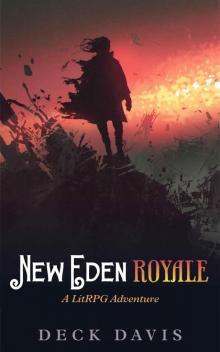 New Eden Royale
New Eden Royale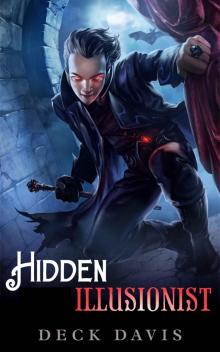 The Hidden Illusionist (Thieves of Chaos Book 1)
The Hidden Illusionist (Thieves of Chaos Book 1)